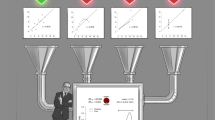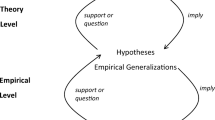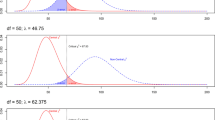Abstract
The mechanistic and causal accounts of explanation are often conflated to yield a ‘causal-mechanical’ account. This paper prizes them apart and asks: if the mechanistic account is correct, how can causal explanations be explanatory? The answer to this question varies according to how causality itself is understood. It is argued that difference-making, mechanistic, dualist and inferentialist accounts of causality all struggle to yield explanatory causal explanations, but that an epistemic account of causality is more promising in this regard.
Similar content being viewed by others
Notes
There may be more than one such chain from A 0 to E—i.e., a network of events—but there should be at least one such chain.
One might think that such cases of overdetermination can be dissolved by appealing to chains of difference-making involving intermediate events, but there are analogous particle-decay examples where the prospect of finding suitable intermediate events is rather dim (see, e.g., Williamson 2009, §9).
Darden (2013) also argues that causal explanations are impoverished in comparison to mechanistic explanations, by analysing cystic fibrosis as a case study.
The standard response of the mechanist to this problem of causation between absences is to say that the causal claim is made true by the fact that the expected mechanism didn’t operate. This move yields pluralism: a mechanistic account of causation between presences and a counterfactual account of causation between absences (had the button been pressed then the door would have opened). This sort of response is criticised in Williamson (2011) and in Sect. 5 below.
This characterisation leaves room for a certain amount of subjectivity as to what causes what, where two ideal causal epistemologies disagree. As with Bayesian accounts of probability, there is scope for different epistemic accounts of causality to yield differing degrees of subjectivity. Accounts towards the objective end of the spectrum are defended in Williamson (2005, 2010).
For the mechanistic account of explanation to offer an independent standard of explanatory success, one would not want to go on to analyse mechanisms in terms of causality, for fear of circularity. This is not to say, however, that mechanisms should not invoke causal relationships. Rather, mechanisms should not bottom-out by appealing to epistemic causality. Instead, whatever is taken to explain the workings of the lowest-level mechanisms should be other than causal beliefs—basic activities, dispositional properties or fundamental laws will do, for example.
References
Anscombe, G. (1971). Causality and determinism. Cambridge: Cambridge University Press.
Bechtel, W., & Abrahamsen, A. (2005). Explanation: A mechanist alternative. Studies in History and Philosophy of Biological and Biomedical Sciences, 36, 421–441.
Bradford Hill A. (1965). The environment and disease: Association or causation? Proceedings of the Royal Society of Medicine, 58, 295–300.
Cartwright, N. (2004). Causation: One word, many things. Philosophy of Science, 71, 805–819.
Cartwright, N., & Efstathiou, S. (2011). Hunting causes and using them: Is there no bridge from here to there? International Studies in the Philosophy of Science, 25(3), 223–241.
Chadeau-Hyam, M., Athersuch, T. J., Keun, H. C., Iorio, M. D., Ebbels, T. M., Jenab, M., Sacerdote, C., Bruce, S. J., Holmes, E., & Vineis, P. (2011). Meeting-in-the-middle using metabolic profiling—A strategy for the identification of intermediate biomarkers in cohort studies. Biomarkers, 16(1), 83–88.
Clarke, B., Gillies, D., Illari, P., Russo, F., & Williamson, J. (2012). The evidence that evidence-based medicine omits. Preventative Medicine. doi: 10.1016/j.ypmed.2012.10.020.
Cohen, J. & Callender, C. (2009). A better best system account of lawhood. Philosophical Studies, 145, 1–34.
Craver, C. F. (2007). Explaining the brain. Oxford: Oxford University Press.
Darden, L. (2013). Mechanisms versus causes in biology and medicine. In H.-K. Chao, S.-T. Chen & R. Millstein (Eds.), Mechanism and causality in biology and economics, theory, philosophy, and history of the life sciences (Chap. 2). Berlin: Springer.
Dowe, P. (2000). Physical causation. Cambridge: Cambridge University Press.
Glennan, S. (2002). Rethinking mechanistic explanation. Philosophy of Science, 69, S342–S353.
Glennan, S. S. (1996). Mechanisms and the nature of causation. Erkenntnis, 44, 49–71.
Hall, N. (2004). Two concepts of causation. In J. Collins, N. Hall & L. Paul (Eds.) Causation and counterfactuals (pp. 225–276). Cambridge, MA: MIT Press.
Illari, P. M., & Williamson, J. (2011). Mechanisms are real and local. In P. M. Illari, F. Russo & J. Williamson (Eds.), Causality in the sciences (pp. 818–844). Oxford: Oxford University Press.
Illari. P. M., & Williamson. J. (2012). What is a mechanism? Thinking about mechanisms across the sciences. European Journal for Philosophy of Science, 2, 119–135.
Lakatos, I. (1978). Understanding Toulmin. In J. Worrall & G. Currie (Eds.) Mathematics, science and epistemology: Philosophical papers (Vol. 2, pp. 224–243). Cambridge: Cambridge University Press.
Lewis, D. K. (Ed.). (1973). Causation. In Philosophical papers (Vol. 2, pp. 159–213). Oxford: Oxford University Press.
Lewis, D. K. (Ed.). (1980). A subjectivist’s guide to objective chance. In Philosophical papers (Vol. 2, pp. 83–132). Oxford: Oxford University Press. (With postscripts).
Lewis, D. K. (Ed.). (1986a). Causal explanation. In Philosophical papers (Vol. 2, pp. 214–240). Oxford: Oxford University Press.
Lewis, D. K. (Ed.). (1986b). Counterfactual dependence and time’s arrow. In Philosophical papers (Vol. 2, pp. 32–66). Oxford: Oxford University Press. (With postscripts).
Longworth, F. (2006a). Causation, counterfactual dependence and pluralism. PhD thesis, University of Pittsburgh.
Longworth, F. (2006b). Causation, pluralism and responsibility. Philosophica, 77, 45–68
Machamer, P., Darden, L., & Craver, C. (2000). Thinking about mechanisms. Philosophy of Science, 67, 1–25.
Menzies, P. & Price, H. (1993). Causation as a secondary quality. British Journal for the Philosophy of Science, 44, 187–203.
Price, H. (1991). Agency and probabilistic causality. British Journal for the Philosophy of Science, 42, 157–176.
Psillos, S. (2009). Causal pluralism. In R. Vanderbeeken & B. D’Hooghe (Eds.) Worldviews, science and Us: Studies of analytical metaphysics. A selection of topics from a methodological perspective (pp. 131–151). Singapore: World Scientific.
Reichenbach, H. (1956). The direction of time. Berkeley: University of California Press. (1971 edition.)
Reiss, J. (2011). Third time’s a charm: Causation, science and Wittgensteinian pluralism. In P. M. Illari, F. Russo & J. Williamson (Eds.), Causality in the sciences (pp. 907–927). Oxford: Oxford University Press.
Russo, F., & Williamson, J. (2007). Interpreting causality in the health sciences. International Studies in the Philosophy of Science, 21(2), 157–170.
Russo, F., & Williamson, J. (2011). Epistemic causality and evidence-based medicine. History and Philosophy of the Life Sciences, 33(4), 563–582.
Russo, F., & Williamson, J. (2012). EnviroGenomarkers: The interplay between mechanisms and difference making in establishing causal claims. Medicine Studies: International Journal for the History, Philosophy and Ethics of Medicine and Allied Sciences, 3, 249–262.
Salmon, W. C. (1984). Scientific explanation and the causal structure of the world. Princeton, NJ: Princeton University Press.
Salmon, W. C. (1998). Causality and explanation. Oxford: Oxford University Press.
Weinberg, R. A. (2007). The biology of cancer. NewYork: Garland Science.
Williamson, J. (2005). Bayesian nets and causality: Philosophical and computational foundations. Oxford: Oxford University Press.
Williamson, J. (2006). Causal pluralism versus epistemic causality. Philosophica, 77, 69–96.
Williamson, J. (2009). Probabilistic theories. In H. Beebee, C. Hitchcock & P. Menzies (Eds.) The Oxford handbook of causation (pp. 185–212). Oxford: Oxford University Press.
Williamson, J. (2010). In defence of objective Bayesianism. Oxford: Oxford University Press.
Williamson, J. (2011). Mechanistic theories of causality. Philosophy Compass, 6(6), 421–447.
Woodward, J. (2003). Making things happen: A theory of causal explanation. Oxford: Oxford University Press.
Acknowledgments
This research was conducted as a part of the research project Mechanisms and the evidence hierarchy, supported by the UK Arts and Humanities Research Council. I am very grateful to Lorenzo Casini, Start Glennan, Julien Murzi, Erik Weber and an anonymous referee for comments on earlier versions of this paper.
Author information
Authors and Affiliations
Corresponding author
Rights and permissions
About this article
Cite this article
Williamson, J. How Can Causal Explanations Explain?. Erkenn 78 (Suppl 2), 257–275 (2013). https://doi.org/10.1007/s10670-013-9512-x
Received:
Accepted:
Published:
Issue Date:
DOI: https://doi.org/10.1007/s10670-013-9512-x




